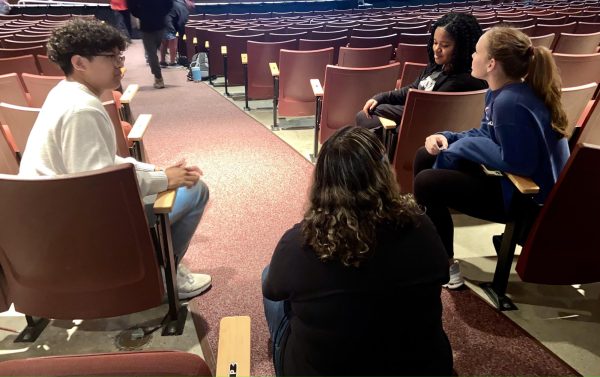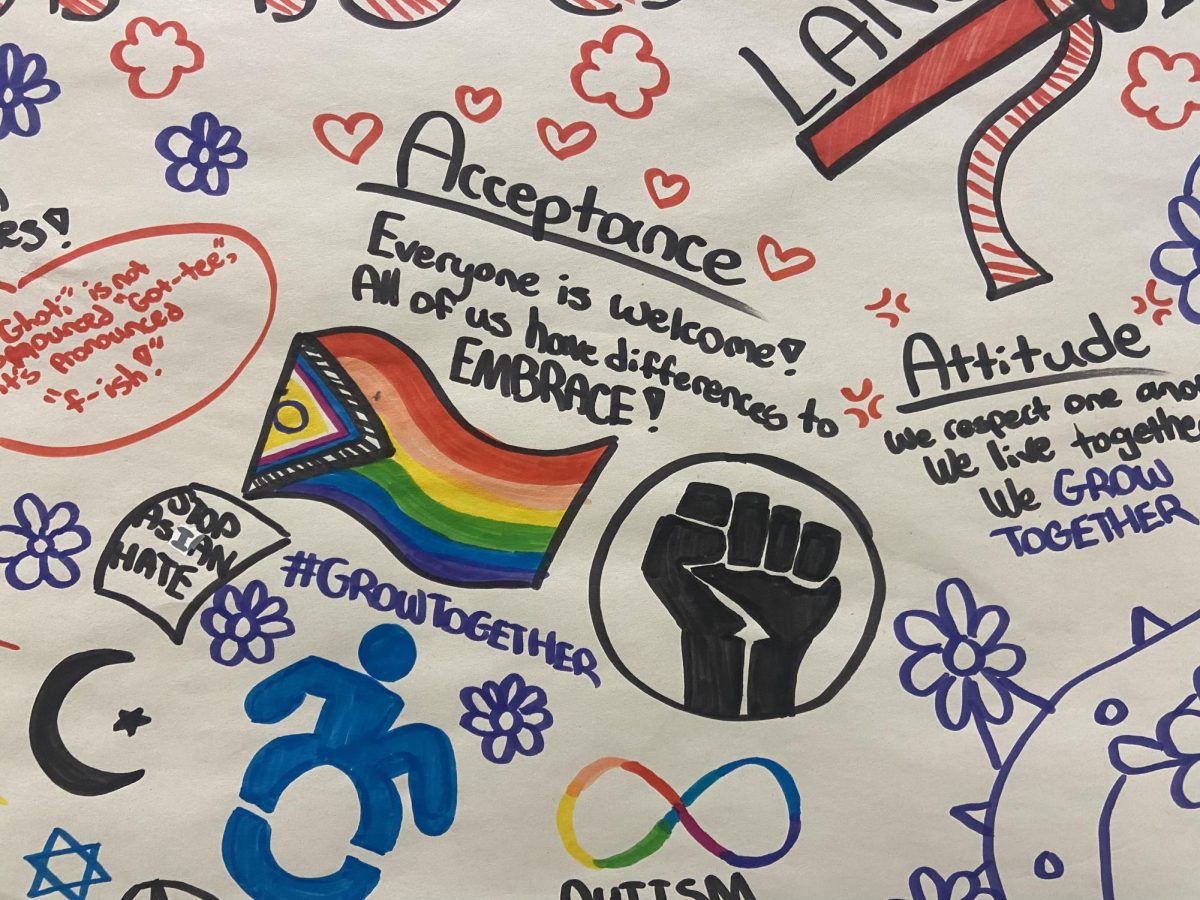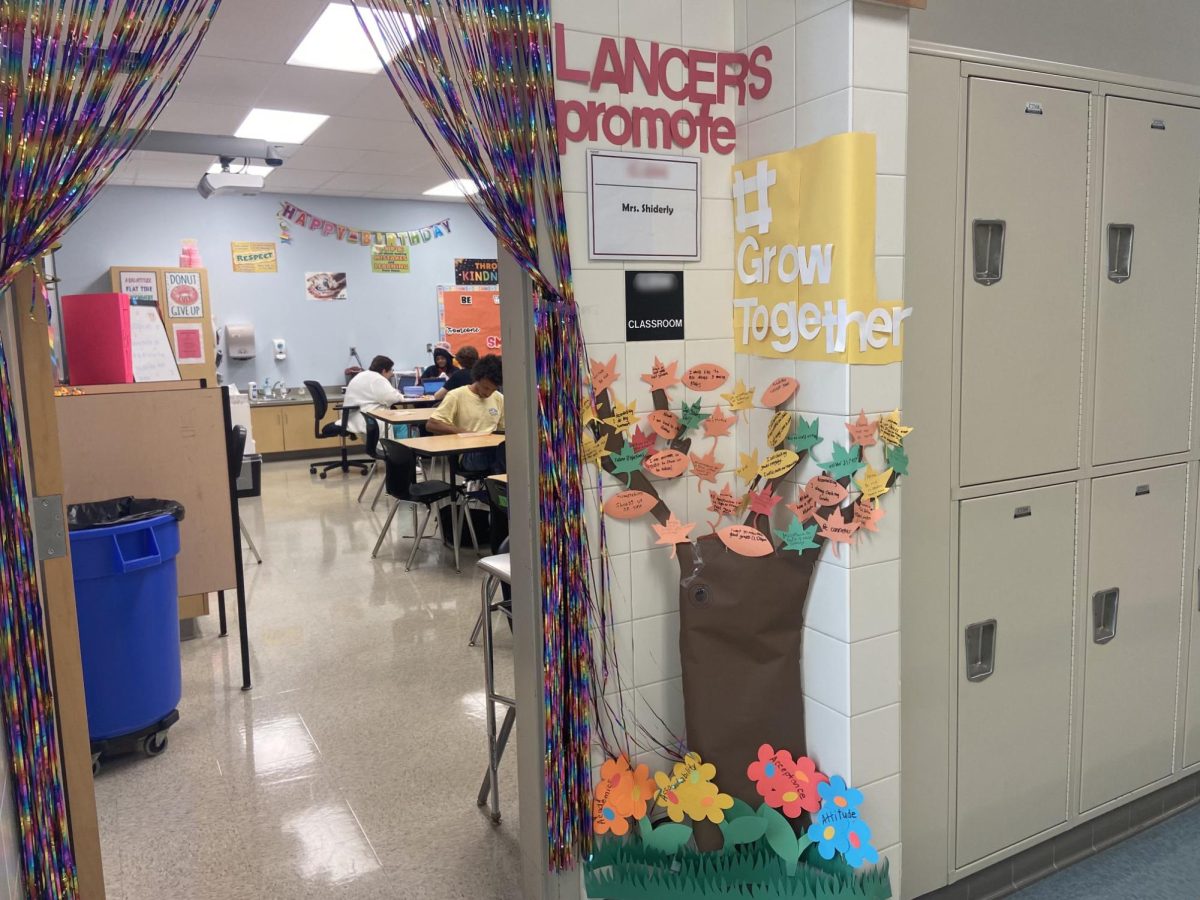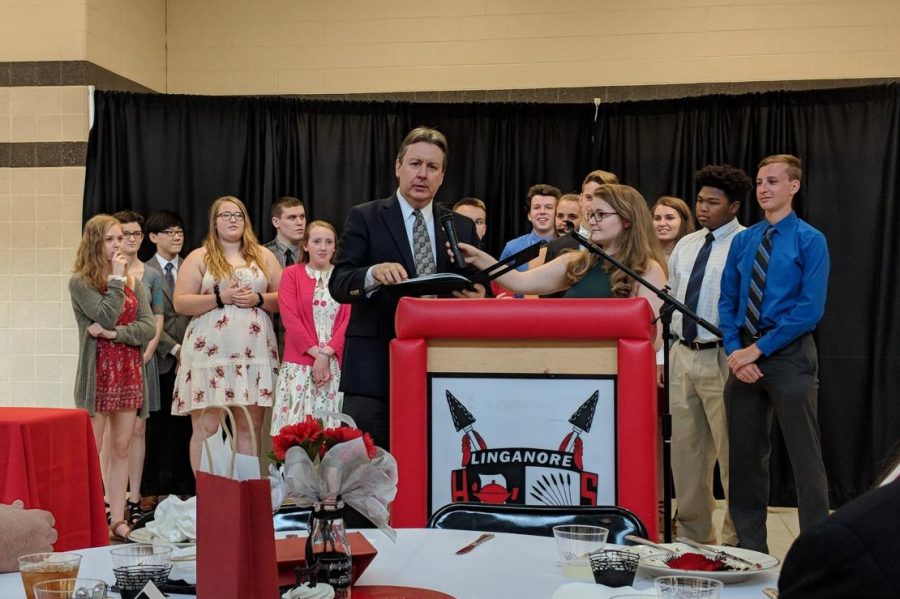To many students, “A” is just the first letter of the alphabet, but at Linganore High School (LHS), the letter A represents so much more.
During the 2022-23 school year, a group of students wrote out a racial slur in toilet paper as a “senior prank.” This action caused turmoil within the community. In response to this “prank,” during an end-of-year award ceremony for underclassmen, LHS principal Dr. Michael Dillman announced the addition of a new core value, Acceptance, to the existing three LHS principles: Academics, Accountability and Attitude.
For many years, Linganore’s mission has been to equip students for life-long learning through lessons in Academics, Accountability and Attitude. Many agree that acts of discrimination and racism tarnish the school’s reputation built by both students and staff during their time at Linganore.
Elena Power, the junior drum major in Linganore High School’s marching band, believes actions speak volumes.
“I think it’s kind of embarrassing for our school that the prank is what we’re known for, and I think when one person or one group of people does something like that it kind of makes everyone look bad, and then we get a reputation,” said Power.
Some students say that acts of injustice do not only hurt reputations, but feelings as well.
“I thought they [the seniors involved] were better than that and smarter than that, and they just did it [the prank] like a slap in the face,” said Black Student Union (BSU) president senior Cassandra Nti.
Change is a difficult process for everyone. For some incoming freshmen, coming to high school is usually a nerve-wracking experience, and the same goes for those who simply may wish to try new things. Everyone, however, wants to be accepted. Assistant principal Raeda Zietoon believes that the principle of acceptance is of paramount importance.
“I think it’s a great idea no matter where you are, whether it’s at Linganore High School or anywhere else– especially in our volatile world that we live in today,” Zietoon said. “We need that fourth “A”, that acceptance.”
The journey of acceptance is a long road. While the fourth principle at Linganore is believed to be a step in the right direction, how will Linganore know when this destination has been reached?
To know when acceptance has been achieved, it must first be defined. Of the many ways one can define acceptance, International Thespian Honor Society (ITS) president Connor Nanavaty says that acceptance is all about celebrating differences.
“Acceptance to me is being able to celebrate and being able to respect the differences of others and understand what makes every person unique,” Nanavaty said. “It’s also being able to support people however they identify, however they may be, however they may feel.”
However, some students are reluctant to embrace change, accepting the differences of others. Within the first week of school, on August 24, an email was sent from Dillman to parents and students addressing a slur directed towards the Black, African-American community found written on a desk. In the month of September, a swastika was found carved on a classroom windowsill.
Multiple students believe that in the same way violence begets violence, hate begets hate. Junior Faith Kyere believes issues of racism and discrimination are overlooked within the Lancer community.
“I hate when people act like it’s only a small portion of our student body that’s racist, when in reality, it’s only a small portion that was bold enough to act on their hatred,” said Kyere.
While the recently established principle has been a pivotal stage for efforts made in terms of inclusivity and diversity, it is not the only form of action that has been taken. As part of the daily morning announcements, which detail a wide range of events from the latest soccer game to the next meeting for chess club, Dillman briefly informs students on things occurring both inside and outside the school that extend to the community, constantly shifting the spotlight.
He believes that the morning announcements are not only a great way to undo bad press, but to create a public change.
“We really try to be inclusive and make sure that everybody has representation, so it didn’t matter if you were field hockey or football or the Gender-Sexuality Alliance (GSA) or the Black Student Union (BSU) or National Honor Society (NHS), everybody was doing really good work,” Dillman said. “So how do we publicize that and celebrate it? We lift up, we shout out, we celebrate all these things, and let people know all the great things that are happening.”
The common conclusion drawn by both staff and students is that great things do not just happen overnight. Numerous students agree that one way to promote the change from discrimination to diversity acceptance is to talk about it; when choosing between tolerating it or talking about it, they talk about it.
Some members of the Lancer community feel that it is essential to talk about discriminatory issues no matter how ugly. Senior Matthew Buehler is not afraid to talk about the ugly.
“There’s people who just bask in their ignorance or who choose not to educate themselves because that’s more convenient for them– it’s just hard to think why people would just be hateful,” said Buehler. This raises the question– is it easier to be hateful?
Lily Godette is a senior at Linganore and comments that “hate takes up both time and energy, and is time not well spent.” While having hard conversations is a substantial part of change, actions sometimes speak louder than words.
“Just simply saying ‘this is unacceptable, so we’re going to add a fourth “A” for acceptance’ isn’t going to change everything; it’s not enough,” said Godette. “You actually have to act on it, and you have to want to educate and learn for yourself.”
Erik Engelstatter is an assistant principal and is the coordinator of Student Voices at Linganore. Student Voices is an ongoing program held at LHS in which students are able to meet with teachers and administrators to address concerns or any issues within the school. He shares a similar opinion.
“I don’t know what’s in the heart of others, but the intent doesn’t matter. The act is what matters,” Engelstatter said. “Education comes from exposure, but I think it also comes from experience and from having those conversations.”
Senior Ava Taylor considers Student Voices to be another considerable way to make headway in terms of building acceptance in the community.
“I think Student Voices brings together people that wouldn’t normally converse and intermingle, which helps people accept each others differences; because, once you get to know each other, you find out that you’re really not all that different,” said Taylor.

Engelstatter raises the fact that there is always going to be that element in society where there are people that do not want to be a part of the culture or have some sort of negative attitude towards the culture. He thinks the main question is how can we be agents of change.
“How do you reach those other people? How do you educate them? It’s a question we’re still working on,” Engelstatter said.
The general consensus between the student body and administration team is that while progress has been made, there are still great strides to be made in regards to inclusion and acceptance; however, in the famous words of Mahatma Gandhi, “our ability to reach unity in diversity will be the beauty and the test of our civilization.”
















